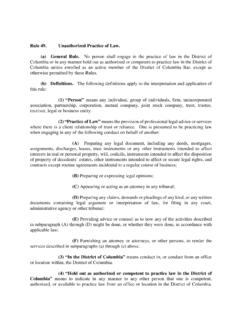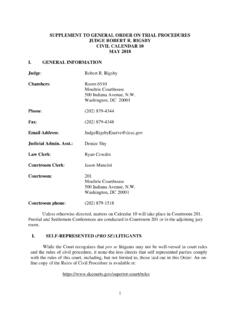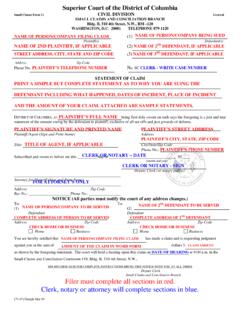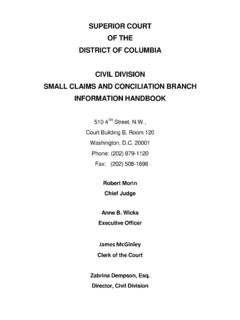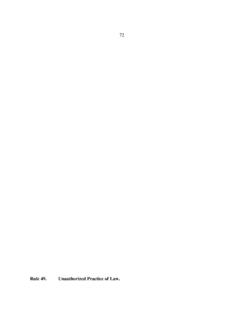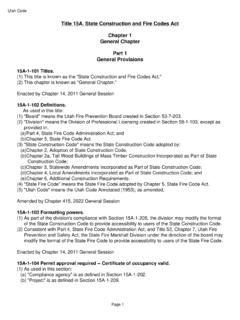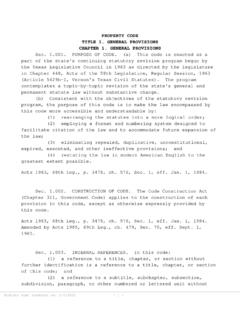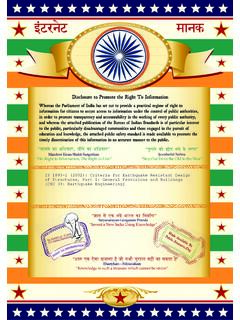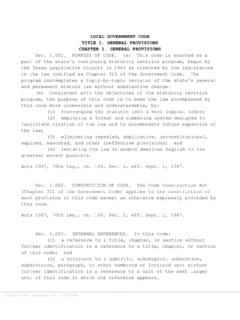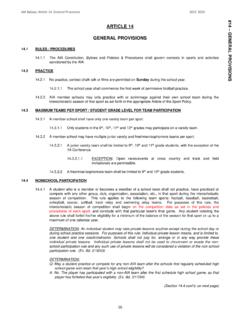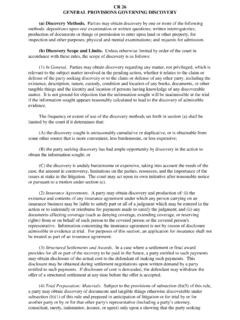Transcription of Rule 26. Duty to Disclose; General Provisions Governing ...
1 Rule 26. Duty to Disclose; General Provisions Governing Discovery (a) REQUIRED DISCLOSURES. (1) [Omitted]. (2) Disclosure of Expert Testimony. (A) In General . A party must disclose to the other parties the identity of any witness it may use at trial to present expert testimony. (B) Witnesses Who Must Provide a Written Report. Unless otherwise stipulated or ordered by the court, this disclosure must be accompanied by a written report if the witness is one retained or specially employed to provide expert testimony in the case or one whose duties as the party's employee regularly involve giving expert testimony. The report must contain: (i) a complete statement of all opinions the witness will express and the basis and reasons for them; (ii) the facts or data considered by the witness in forming them; (iii) any exhibits that will be used to summarize or support them; (iv) the witness's qualifications, including a list of all publications authored in the previous 10 years; (v) a list of all other cases in which, during the previous 4 years, the witness testified as an expert at trial or by deposition; (vi) a statement of the compensation to be paid for the study and testimony in the case.
2 And (vii) the following certification, signed by the witness: I hereby certify that this report is a complete and accurate statement of all of my opinions, and the basis and reasons for them, to which I will testify under oath. (C) Witnesses Who Do Not Provide a Written Report. Unless otherwise stipulated or ordered by the court, if the witness is not required to provide a written report, this disclosure must state: (i) the subject matter on which the witness is expected to present evidence; and (ii) a summary of the facts and opinions to which the witness is expected to testify. (D) Time to Disclose Expert Testimony. A party must make these disclosures at the times and in the sequence set forth in the scheduling order issued pursuant to Rule 16(b)(5)(C) and (D).
3 (E) Supplementing the Disclosure. The parties must supplement these disclosures when required under Rule 26(e). (3) [Omitted]. (4) Form of Disclosures. Unless the court orders otherwise, all disclosures under Rule 26(a) must be in writing, signed, and served. (b) DISCOVERY SCOPE AND LIMITS. (1) Scope in General . Unless otherwise limited by court order, the scope of discovery is as follows: Parties may obtain discovery regarding any nonprivileged matter that is relevant to any party s claim or defense and proportional to the needs of the case, considering the importance of the issues at stake in the action, the amount in controversy, the parties relative access to relevant information, the parties resources, the importance of the discovery in resolving the issues, and whether the burden or expense of the proposed discovery outweighs its likely benefit.
4 Information within this scope of discovery need not be admissible in evidence to be discoverable. (2) Limitations on Frequency and Extent. (A) When Permitted. By order, the court may alter the limits in these rules on the number of depositions and interrogatories or length of depositions under Rule 30. By order, the court may also limit the number of requests under Rule 36. (B) Specific Limitations on Electronically Stored Information. A party need not provide discovery of electronically stored information from sources that the party identifies as not reasonably accessible because of undue burden or cost. On motion to compel discovery or for a protective order, the party from whom discovery is sought must show that the information is not reasonably accessible because of undue burden or cost.
5 If that showing is made, the court may nonetheless order discovery from such sources if the requesting party shows good cause, considering the limitations of Rule 26(b)(2)(C). The court may specify conditions for the discovery. (C) When Required. On motion or on its own, the court must limit the frequency or extent of discovery otherwise allowed by these rules if it determines that: (i) the discovery sought is unreasonably cumulative or duplicative, or can be obtained from some other source that is more convenient, less burdensome, or less expensive; (ii) the party seeking discovery has had ample opportunity to obtain the information by discovery in the action; or (iii) the proposed discovery is outside the scope permitted by Rule 26(b)(1).
6 (3) Trial Preparation: Materials. (A) Documents and Tangible Things. Ordinarily, a party may not discover documents and tangible things that are prepared in anticipation of litigation or for trial by or for another party or its representative (including the other party's attorney, consultant, surety, indemnitor, insurer, or agent). But, subject to Rule 26(b)(4), those materials may be discovered if: (i) they are otherwise discoverable under Rule 26(b)(1); and (ii) the party shows that it has substantial need for the materials to prepare its case and cannot, without undue hardship, obtain their substantial equivalent by other means. (B) Protection Against Disclosure. If the court orders discovery of those materials, it must protect against disclosure of the mental impressions, conclusions, opinions, or legal theories of a party s attorney or other representative concerning the litigation.
7 (C) Previous Statement. Any party or other person may, on request and without the required showing, obtain the person s own previous statement about the action or its subject matter. If the request is refused, the person may move for a court order, and Rule 37(a)(5) applies to the award of expenses. A previous statement is either (i) a written statement that the person has signed or otherwise adopted or approved; or (ii) a contemporaneous stenographic, mechanical, electrical, or other recording or a transcription of it that recites substantially verbatim the person s oral statement. (4) Trial Preparation: Experts. (A) Deposition of an Expert Who May Testify. A party may depose any person who has been identified as an expert whose opinions may be presented at trial.
8 If Rule 26(a)(2) requires a report from an expert, the deposition may be conducted only after the report is provided. (B) Trial-Preparation Protection for Draft Reports or Disclosures. Rules 26(b)(3)(A) and (B) protect drafts of any report or disclosure required under Rule 26(a)(2), regardless of the form in which the draft is recorded. (C) Trial-Preparation Protection for Communications Between a Party's Attorney and Expert Witnesses. Rules 26(b)(3)(A) and (B) protect communications between the party's attorney and any witness required to provide a report under Rule 26(a)(2)(B), regardless of the form of the communications, except to the extent that the communications: (i) relate to compensation for the expert's study or testimony; (ii) identify facts or data that the party's attorney provided and that the expert considered in forming the opinions to be expressed; or (iii) identify assumptions that the party's attorney provided and that the expert relied on in forming the opinions to be expressed.
9 (D) Expert Employed Only for Trial Preparation. Ordinarily, a party may not, by interrogatories or deposition, discover facts known or opinions held by an expert who has been retained or specially employed by another party in anticipation of litigation or to prepare for trial and who is not expected to be called as a witness at trial. But a party may do so only: (i) as provided in Rule 35(b); or (ii) on showing exceptional circumstances under which it is impracticable for the party to obtain facts or opinions on the same subject by other means. (E) Payment. Unless manifest injustice would result, the court must require that the party seeking discovery: (i) pay the expert a reasonable fee for time spent in responding to discovery under Rule 26(b)(4)(A) or (D); and (ii) for discovery under (D), also pay the other party a fair portion of the fees and expenses it reasonably incurred in obtaining the expert s facts and opinions.
10 (5) Claiming Privilege or Protecting Trial-Preparation Materials. (A) Information Withheld. When a party withholds information otherwise discoverable by claiming that the information is privileged or subject to protection as trial-preparation material, the party must: (i) expressly make the claim; and (ii) describe the nature of the documents, communications, or tangible things not produced or disclosed and do so in a manner that, without revealing information itself privileged or protected, will enable other parties to assess the claim. (B) Information Produced. If information produced in discovery is subject to a claim of privilege or of protection as trial-preparation material, the party making the claim may notify any party that received the information of the claim and the basis for it.
